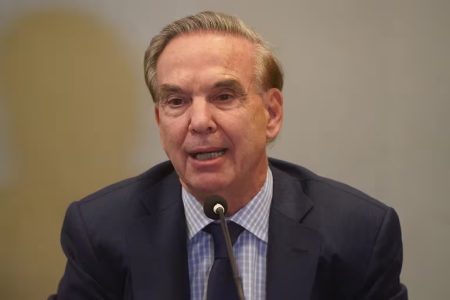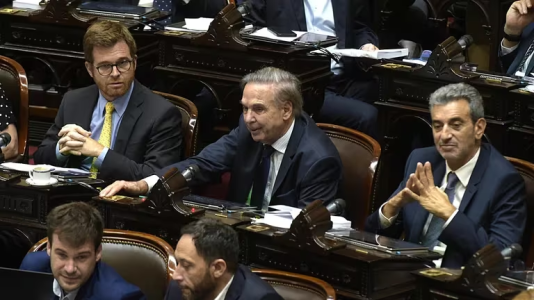Olivia1
Member
Pichetto stated that “the relationship with Congress has to be reformulated” after the fall of the Omnibus Law - Infobae

Source:

 www.infobae.com
www.infobae.com
February 08, 2024
The deputy assured that it was a key factor that the dialogue with the governors was recomposed, after the ruling party called them “traitors.”

The former member of the Justicialista Party stressed that the Government will need to have the support of the governors (Franco Fafasuli)
In the midst of the friction between the ruling party and the opposition that generated the fall of the Omnibus Law , Miguel Ángel Pichetto pointed out that the Government has to continue with the work of achieving a parliamentary majority that supports the proposals and reforms that it could present in the future. . “The relationship with Congress has to be reformulated,” he stated in reference to the accusations made against the deputies who voted against during the particular treatment.
“Going to committee means starting over, I think we have to try to lower our spirits,” analyzed the president of the We Make Federal Coalition bloc , in reference to the brake placed on the treatment of the bill sent from the Executive Branch after that the votes necessary for the half-sanction were not obtained. Likewise, he considered that having labeled the members of the National Congress who refused to support the initiative as “traitors” could be counterproductive for the current administration.
Although the deputy tried to put a cold shoulder to the situation, he differed from the angry posture that the Government embodied by stating that "I never had the concept of a traitor in politics incorporated in my head." In this way, he explained that in his conception of politics, the modifications and attitudes that could be reflected would be part of the “mechanics” of the field.
“We have to dialogue, that's politics,” said the representative of the Federal Republican Meeting after he defended that the parliamentary system works by giving an example of the political bloc he leads, since it is made up of several leaders with “personal stories and positions.” " different. As a result of the melting pot of positions included in the front, the legislative representative stated that in the group there were both deputies who voted in favor and those who opted against the initiative.

Pichetto explained that in his block there were members who supported and others who voted against the law (Gustavo Gavotti)
“A short time ago I said that the Government has to consolidate a parliamentary majority, it was not that far off if you analyze the days that were experienced,” he said, recalling that in the general vote of the Omnibus Law they achieved approval with the support of 144 deputies. . In this sense, Pichetto maintained that "the relationship with Congress has to be reformulated and fundamentally we have to go to a meeting on a path of institutional dialogue with the provinces", because it would be a key issue for the four years of government that they are ahead.
Although the opposition described the passage of the Omnibus Law through Congress as a defeat for the ruling party, the representative of Hacemos Coalificación Federal recognized that the Government should work more in dialogue with the opponents. "When we did the fourth intermission on Friday night, which was precisely to adjust some details of the vote in particular, we thought and believed that there was going to be a dialogue with the governors who had accompanied the general vote," he explained, interpreting that several of the provincial leaders would have withdrawn their support due to the lack of “certainties.”
On the other hand, the member of the Lower House stated that "it would have been positive for the Government if the law had come out even with modifications", but pointed out that the lack of "flexibility" on the part of the ruling party to be able to advance with at least a part of the reforms that were proposed in the document composed of 382 articles. Although he appreciated that the new administration aspires to modify the vision of society, he admitted that “a mega law of 600 articles has contingencies” when it comes to debating it.

The Minister of the Interior was the key figure in the meetings that were held with the provincial leaders (Source)
“I believe that the law was much more symbolic, in terms of the proposals and proposals for modifying a vision of society, than the content of the law itself,” interpreted the head of the federal block in the framework from an interview for the program A dos voices, on TN . In this way, he indicated that the wide range of issues covered by the Base Law would have been the axis of the problem after recommending that it would have been more fruitful to address the necessary fiscal reforms and add legislative modifications gradually.
In fact, the idea of dividing the bill would be the path that would have the greatest support within the ruling party after the Government proposed not presenting the opinion again in the chamber. However, the last word will fall to President Javier Milei , who would agree on the final decision in a meeting to be held between the Executive and Deputies this Thursday.
While the head of state and his cabinet devise the next strategy to adopt, the deputy highlighted the role that the Minister of the Interior, Guillermo Francos , and the presidential advisor Santiago Caputo had in the parliamentary negotiations. “I think there was always a vocation and I think what was missing and what would have helped a lot was the dialogue with the governors,” he reiterated, mentioning that the Córdoba deputies from his block were part of the detractors of the initiative.

Source:

Pichetto planteó que “la relación con el Congreso tiene que ser reformulada” tras la caída de la Ley Ómnibus
El diputado aseguró que era un factor clave que se recompusiera el diálogo con los gobernadores, luego de que el oficialismo los tildara de “traidores”
February 08, 2024
The deputy assured that it was a key factor that the dialogue with the governors was recomposed, after the ruling party called them “traitors.”

The former member of the Justicialista Party stressed that the Government will need to have the support of the governors (Franco Fafasuli)
In the midst of the friction between the ruling party and the opposition that generated the fall of the Omnibus Law , Miguel Ángel Pichetto pointed out that the Government has to continue with the work of achieving a parliamentary majority that supports the proposals and reforms that it could present in the future. . “The relationship with Congress has to be reformulated,” he stated in reference to the accusations made against the deputies who voted against during the particular treatment.
“Going to committee means starting over, I think we have to try to lower our spirits,” analyzed the president of the We Make Federal Coalition bloc , in reference to the brake placed on the treatment of the bill sent from the Executive Branch after that the votes necessary for the half-sanction were not obtained. Likewise, he considered that having labeled the members of the National Congress who refused to support the initiative as “traitors” could be counterproductive for the current administration.
Although the deputy tried to put a cold shoulder to the situation, he differed from the angry posture that the Government embodied by stating that "I never had the concept of a traitor in politics incorporated in my head." In this way, he explained that in his conception of politics, the modifications and attitudes that could be reflected would be part of the “mechanics” of the field.
“We have to dialogue, that's politics,” said the representative of the Federal Republican Meeting after he defended that the parliamentary system works by giving an example of the political bloc he leads, since it is made up of several leaders with “personal stories and positions.” " different. As a result of the melting pot of positions included in the front, the legislative representative stated that in the group there were both deputies who voted in favor and those who opted against the initiative.

Pichetto explained that in his block there were members who supported and others who voted against the law (Gustavo Gavotti)
“A short time ago I said that the Government has to consolidate a parliamentary majority, it was not that far off if you analyze the days that were experienced,” he said, recalling that in the general vote of the Omnibus Law they achieved approval with the support of 144 deputies. . In this sense, Pichetto maintained that "the relationship with Congress has to be reformulated and fundamentally we have to go to a meeting on a path of institutional dialogue with the provinces", because it would be a key issue for the four years of government that they are ahead.
Although the opposition described the passage of the Omnibus Law through Congress as a defeat for the ruling party, the representative of Hacemos Coalificación Federal recognized that the Government should work more in dialogue with the opponents. "When we did the fourth intermission on Friday night, which was precisely to adjust some details of the vote in particular, we thought and believed that there was going to be a dialogue with the governors who had accompanied the general vote," he explained, interpreting that several of the provincial leaders would have withdrawn their support due to the lack of “certainties.”
On the other hand, the member of the Lower House stated that "it would have been positive for the Government if the law had come out even with modifications", but pointed out that the lack of "flexibility" on the part of the ruling party to be able to advance with at least a part of the reforms that were proposed in the document composed of 382 articles. Although he appreciated that the new administration aspires to modify the vision of society, he admitted that “a mega law of 600 articles has contingencies” when it comes to debating it.

The Minister of the Interior was the key figure in the meetings that were held with the provincial leaders (Source)
“I believe that the law was much more symbolic, in terms of the proposals and proposals for modifying a vision of society, than the content of the law itself,” interpreted the head of the federal block in the framework from an interview for the program A dos voices, on TN . In this way, he indicated that the wide range of issues covered by the Base Law would have been the axis of the problem after recommending that it would have been more fruitful to address the necessary fiscal reforms and add legislative modifications gradually.
In fact, the idea of dividing the bill would be the path that would have the greatest support within the ruling party after the Government proposed not presenting the opinion again in the chamber. However, the last word will fall to President Javier Milei , who would agree on the final decision in a meeting to be held between the Executive and Deputies this Thursday.
While the head of state and his cabinet devise the next strategy to adopt, the deputy highlighted the role that the Minister of the Interior, Guillermo Francos , and the presidential advisor Santiago Caputo had in the parliamentary negotiations. “I think there was always a vocation and I think what was missing and what would have helped a lot was the dialogue with the governors,” he reiterated, mentioning that the Córdoba deputies from his block were part of the detractors of the initiative.

